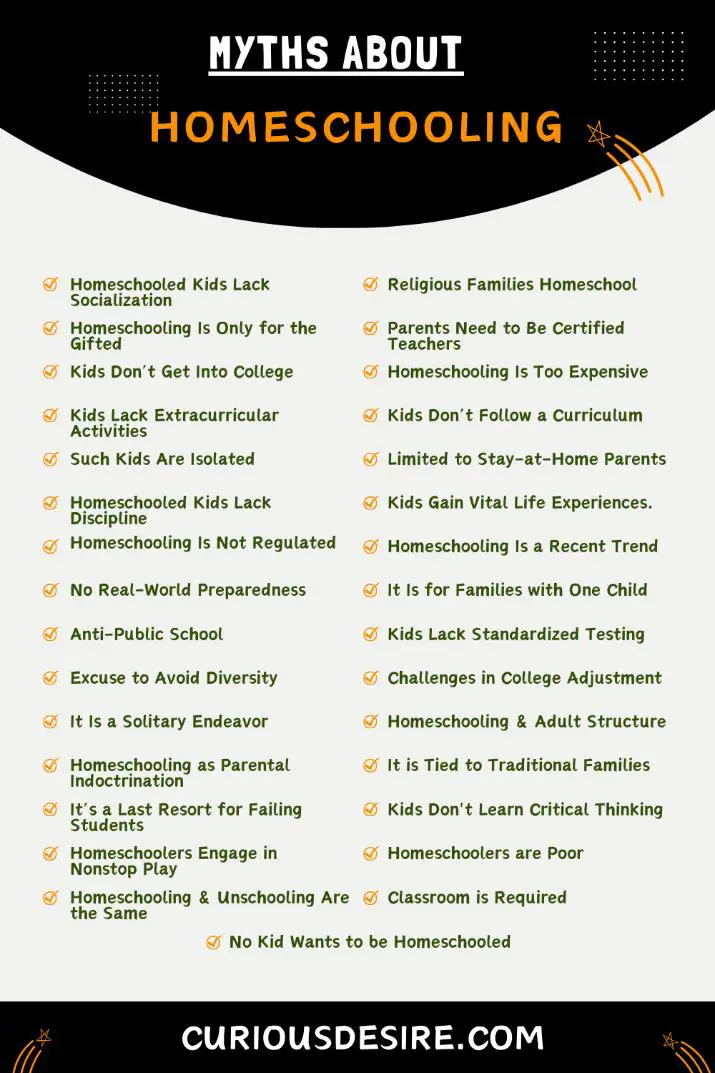Homeschooling, which used to be a less common way of teaching, is getting more attention nowadays.
Many families are choosing it instead of regular schools. But, there are some misunderstandings and wrong ideas about homeschooling.
Some people don’t know much about the different ways families do homeschooling. Because of this, there are many wrong information going around.
In this discussion, we’ll some common misconceptions about homeschooling. Let’s get started!
5 Most Common Myths about homeschooling:
- Homeschooling is Only for Religious Families.
- Parents Need to Be Certified Teachers.
- Homeschooled Kids Lack Discipline.
- Homeschooling is Only for Stay-at-Home Parents.
- Homeschooled Kids Don’t Get Into College.
[toc]

Myth 1: Homeschooled Kids Lack Socialization
Why This Myth Exists:
The myth suggesting that homeschooled children lack socialization often stems from a misperception that homeschooling isolates kids from their peers.
The traditional school setting is commonly associated with structured social interactions, leading to the assumption that homeschoolers miss out on vital social experiences.
Debunking the Myth:
Homeschooled children actively engage in diverse social activities.
They participate in community groups, sports teams, and various extracurriculars, promoting meaningful interactions with peers, family, and community members.
Socialization in homeschooling extends beyond the classroom, providing unique and valuable experiences.
Myth 2: Only Religious Families Homeschool
Why This Myth Exists:
The misconception that only religious families choose homeschooling has historical roots.
Homeschooling gained prominence as a choice for religious families aiming to integrate faith into education, contributing to the perception that it is primarily a religious practice.
Debunking the Myth:
In reality, homeschooling appeals to families for a multitude of reasons. It caters to the need for personalized education, flexibility, and addressing specific learning requirements.
Secular and non-religious families also actively choose to homeschool, highlighting its adaptability to different lifestyles and educational philosophies.
Myth 3: Homeschooling Is Only for Academically Gifted Children
Why This Myth Exists:
Some people think that homeschooling is only for kids who are good at traditional school subjects and succeed in regular school.
Also, parents opt for homeschooling only for smart kids who may not find the regular school setting enough for their needs.
Debunking the Myth:
Homeschooling accommodates a broad spectrum of learning abilities. It allows for personalized learning plans designed to individual strengths and challenges.
The emphasis is on meeting the unique needs of each child, whether they require additional support or advanced coursework, debunking the notion that it’s exclusively for the academically gifted.
Myth 4: Parents Need to Be Certified Teachers
Why This Myth Exists:
In the conventional school system, certified teachers are typically responsible for classroom instruction.
Some people extend this idea to believe that only certified teachers can effectively educate children.
Debunking the Myth:
While some homeschooling parents are certified teachers, many successful homeschoolers come from diverse professional backgrounds.
Homeschooling empowers parents to utilize available resources, online courses, and support networks, demonstrating that formal teaching certification is not a prerequisite for providing a quality education.
Myth 5: Homeschooled Kids Don’t Get Into College
Why This Myth Exists:
The view that homeschooled kids don’t get into college may stem from a lack of awareness about the increasing acceptance of homeschooled students by colleges and universities.
In the past, there might have been concerns or biases against homeschooling, assuming it may not adequately prepare students for higher education.
Debunking the Myth:
Homeschooled students are now increasingly accepted into colleges and universities.
Admissions offices recognize the diverse educational experiences and strong self-motivation often found in homeschoolers, making them competitive candidates.
Myth 6: Homeschooling Is Too Expensive
Why This Myth Exists:
The assumption that homeschooling requires extensive resources, curriculum costs, and materials may contribute to the belief that it is financially burdensome.
Debunking the Myth:
In truth, homeschooling can be designed to fit various budgets.
Numerous free or low-cost educational resources are available online, and families can adapt their approach based on financial considerations, making it an affordable option for many.
The myth that homeschooling is prohibitively expensive neglects the flexibility and adaptability inherent in this educational choice.
Myth 7: Homeschooled Kids Lack Extracurricular Activities
Why This Myth Exists:
Media depictions of homeschooling might focus on the home-based academic aspect, omitting the vibrant extracurricular activities that many homeschooling families actively pursue.
This narrow representation can contribute to the misconception.
Also, some individuals may hold biases against homeschooling, viewing it as unconventional or isolating, which can influence their perception of the breadth of experiences homeschooled children have.
Debunking the Myth:
In reality, homeschooled children actively participate in a wide range of extracurricular activities.
Many communities actively involve homeschoolers in diverse extracurricular opportunities, including sports teams, arts programs, and clubs.
The myth that homeschooled kids lack extracurricular engagement overlooks the rich and varied experiences they can enjoy outside the traditional school structure.
Myth 8: Homeschooled Kids Don’t Follow a Curriculum
Why This Myth Exists:
The flexible nature of homeschooling may lead to the assumption that homeschoolers lack a structured curriculum.
Debunking the Myth:
While some families choose a more flexible approach, many homeschooling families follow a structured curriculum designed according to their child’s needs.
The curriculum can be customized to address specific learning styles and interests, providing a well-rounded education.
Homeschooling allows for adaptability, not an absence of structure, debunking the myth that homeschooled kids lack a curriculum.
Myth 9: Homeschooled Kids Are Isolated
Why This Myth Exists:
The notion that homeschooling confines children to isolation may arise from a limited understanding of the various social opportunities outside traditional school environments.
There’s a prevailing notion that homeschooling lacks the structured social setting found in conventional schools.
Debunking the Myth:
The fact is that homeschooled children actively engage in diverse social opportunities.
Beyond traditional classroom settings, they participate in community groups, sports teams, and extracurricular activities, promoting meaningful interactions with peers.

Myth 10: Homeschooling Is Only for Families with Stay-at-Home Parents
Why This Myth Exists:
The myth that homeschooling requires a stay-at-home parent may stem from the assumption that children need constant supervision during school hours.
This myth overlooks the creative scheduling and collaborative approaches many families use to make homeschooling work.
Debunking the Myth:
While having a stay-at-home parent can provide flexibility, many families successfully homeschool with working parents.
Homeschooling can adapt to various schedules, and parents often find creative solutions, such as cooperative arrangements with other homeschooling families or using online resources.
Myth 11: Homeschooled Kids Lack Discipline
Why This Myth Exists:
The assumption that homeschoolers lack discipline may arise from a misunderstanding of the independence and self-direction involved in homeschooling.
Traditional schools are often seen as institutions that instill discipline, leading to the belief that without school, there is no discipline.
Debunking the Myth:
On the contrary, homeschooled children often develop strong self-discipline.
The personalized nature of homeschooling encourages students to take responsibility for their learning. They learn to manage their time effectively, set goals, and work independently.
The point of view that homeschoolers lack discipline overlooks the valuable life skills and habits instilled through this educational approach.
Myth 12: Homeschooled Kids Miss Out on Important Life Experiences
Why This Myth Exists:
The belief that homeschooled children miss out on important life experiences may arise from a narrow perspective on what constitutes valuable life lessons.
Some may perceive traditional school settings as the primary environment for social and life experiences.
Debunking the Myth:
In reality, homeschooled kids have the opportunity to experience a wide range of real-life situations.
Homeschooling allows for flexibility in scheduling, enabling families to travel, explore different cultures, and engage in community activities.
Myth 13: Homeschooling Is Not Regulated
Why This Myth Exists:
The idea that homeschooling is unregulated may arise from a lack of awareness of the legal frameworks and oversight that exist in many regions.
Some may assume that homeschooling operates outside the bounds of educational regulations.
Debunking the Myth:
Homeschooling is subject to regulations and requirements in many jurisdictions.
These regulations vary, covering aspects such as curriculum standards, testing, and reporting.
Homeschooling families often comply with these regulations to ensure their children receive a well-rounded education.
Myth 14: Homeschooling Is a Recent Trend
Why This Myth Exists:
Homeschooling being seen as a recent trend may stem from increased visibility in recent years due to advancements in technology and changes in educational attitudes.
Some may perceive it as a modern phenomenon rather than a longstanding practice.
Debunking the Myth:
Homeschooling has a long and diverse history, dating back centuries and spanning various cultures.
While the contemporary homeschooling movement has gained momentum in recent decades, the practice itself is far from a recent trend.
This perception that homeschooling is a recent phenomenon neglects its rich historical roots.
Myth 15: Homeschooled Kids Are Not Prepared for the Real World
Why This Myth Exists:
Some assume that homeschooling, outside traditional schools, means missing essential experiences.
This stems from stereotypes, suggesting homeschooled children lack exposure to diverse social environments and real-world challenges.
Debunking the Myth:
In reality, homeschooled children often develop practical life skills and problem-solving abilities.
The personalized nature of homeschooling allows for a focus on real-world applications of knowledge.
Additionally, many homeschooled students actively engage in community service, part-time work, and internships, providing valuable real-world experiences.
The myth that homeschooled kids are not prepared for the real world oversimplifies the ways in which homeschooling equips students for life beyond academics.

Myth 16: Homeschooling Is Only for Families with One Child
Why This Myth Exists:
Most people have this misconception that Homeschooling is only feasible for families with one child, which may originate from the assumption that managing the education of multiple children at home is too challenging.
Debunking the Myth:
Contrary to this belief, families with multiple children can successfully homeschool.
Many homeschooling parents develop strategies to manage the education of multiple children simultaneously, such as shared learning activities, group projects, and cooperative learning experiences.
The myth that homeschooling is only for families with one child neglects the adaptability of homeschooling to diverse family structures.
Myth 17: Homeschoolers Are Anti-Public School
Why This Myth Exists:
The assumption that homeschoolers are inherently anti-public schools may arise from occasional criticism of the traditional education system.
Some may interpret the choice to homeschool as a rejection of public schooling.
Debunking the Myth:
In reality, many homeschooling families support public education.
The decision to homeschool is often based on a desire for a personalized and flexible approach to education, rather than opposition to public schools.
Myth 18: Homeschooled Kids Lack Standardized Testing
Why This Myth Exists:
Homeschooled children not undergoing standardized testing may arise from the perception that homeschooling operates outside the conventional testing framework.
Debunking the Myth:
Many homeschooling families voluntarily participate in standardized testing.
Some jurisdictions may require it as part of the regulatory framework, while others use it as an assessment tool to ensure their children’s academic progress.
Myth 19: Homeschooling Is an Excuse to Avoid Diversity
Why This Myth Exists:
The misconception that homeschooling is an excuse to avoid diversity may arise from a misunderstanding of the reasons why some families choose this educational path.
There may be assumptions that homeschooling is a way to create insular environments.
Debunking the Myth:
Many homeschooling families actively seek out diverse experiences.
Homeschooling allows for flexibility in curriculum choices, enabling parents to incorporate diverse perspectives and cultures into their children’s education.
Myth 20: Homeschooled Kids Have Difficulty Adjusting to College Life
Why This Myth Exists:
Traditional schooling is seen as a structured environment that mimics aspects of college life, including classrooms, schedules, and a hierarchical system.
The assumption is that homeschoolers, having been educated in a more flexible setting, might struggle with the transition to a more regimented college atmosphere.
Debunking the Myth:
Homeschooled students often adapt well to college life.
Their experience with self-directed learning, time management, and a diverse range of social interactions positions them favorably in a college setting.
Many colleges recognize the unique strengths of homeschooled students, challenging the myth that they face difficulties adjusting to the college environment.
Myth 21: Homeschooling Is a Solitary Endeavor
Why This Myth Exists:
The assumption that homeschooling is a solitary endeavor may arise from the perception that homeschooled children primarily interact within their immediate family and lack exposure to a broader social network.
Debunking the Myth:
Homeschooling families frequently create networks and cooperatives, forming collaborative communities.
Within these supportive structures, parents and children engage in shared learning experiences and socialization opportunities.
These networks enhance the homeschooling experience and promote a sense of community and collective growth for both parents and children alike.
Myth 22: Homeschooling Leads to a Lack of Structure in Adult Life
Why This Myth Exists:
There may be concerns that the flexible nature of homeschooling, with less emphasis on traditional classroom structure, leads to a lack of discipline and structure in adult life.
Debunking the Myth:
Homeschooled kids often develop excellent organizational and time management skills because of the flexibility in their learning.
This flexibility encourages them to take charge of their schedules and assignments, providing independence and discipline.
Additionally, adapting to various teaching styles prepares them for the challenges they may encounter as adults.
Myth 23: Homeschooling Is an Excuse for Parents to Indoctrinate Their Children
Why This Myth Exists:
This view stems from a misconception and, at times, unfounded concerns about the motives behind homeschooling.
Some individuals may worry that without the oversight of a traditional school system, parents might use homeschooling as a way to impart their personal beliefs, biases, or ideologies to their children.
Debunking the Myth:
While concerns about indoctrination exist, it’s essential to recognize that the majority of homeschooling families prioritize a well-rounded and unbiased education.
Homeschooling offers an opportunity for personalized learning, flexibility, and addressing specific educational needs rather than being a pretext for indoctrination.

Myth 24: Homeschooling Is Only for Families with a Traditional Family Structure
Why This Myth Exists:
The myth that homeschooling is only for families with a traditional structure may be fueled by the belief that it requires a significant amount of time and responsibility, which some associate more with traditional family roles.
There might be an assumption that the commitment and effort required for homeschooling are best met in families adhering to conventional gender roles
Debunking the Myth:
The idea that homeschooling is exclusive to families with a traditional structure is a misconception. Homeschooling is adaptable and successful across various family dynamics.
It is not limited by traditional roles, and many non-traditional family structures effectively manage the responsibilities and time commitments associated with homeschooling.
Breaking free from stereotypes allows us to recognize that homeschooling can thrive in diverse family setups.
Myth 25: Homeschooling Is a Last Resort for Failing Students
Why This Myth Exists:
People unfamiliar with homeschooling may not be aware of the diverse reasons families choose this approach.
Lack of knowledge can lead to assumptions that it is primarily a response to academic struggles.
Debunking the Myth:
Many families choose homeschooling for various reasons, including a desire for a customized education, flexibility, or addressing specific learning needs.
Homeschooling is not solely a last resort; it’s a valid choice that meets the diverse needs and preferences of families.
Myth 26: Homeschooled Kids Don’t Learn Critical Thinking
Why This Myth Exists:
Homeschooled kids not learning critical thinking may stem from misconceptions about the methods and outcomes of homeschooling.
Some people might assume that the lack of a traditional classroom setting inhibits the development of critical thinking skills
Debunking the Myth:
Homeschooled kids get to learn in ways that fit them best, which helps them think critically.
Homeschooling is flexible, so lessons can focus on thinking and problem-solving. This means homeschooled kids can be creative and learn to analyze things.
The idea that homeschooled kids don’t learn critical thinking is too simple. Homeschooling has many ways to teach, and it’s effective in helping kids become good thinkers.
Myth 27: Homeschoolers Engage in Nonstop Play
Why the Myth Exists:
Homeschoolers engaging in nonstop play may arise from a misunderstanding of the flexible nature of homeschooling.
Some people might assume that without the structured hours of a traditional school, homeschooled children have unlimited playtime.
Debunking the Myth:
Homeschooling often involves a well-rounded curriculum, including academic subjects, extracurricular activities, and hands-on learning.
While play is essential for child development, it is not the sole focus of homeschooling. Homeschooled children typically have a balance of educational and recreational activities.
Myth 28: Homeschoolers are Poor
Why the Myth Exists:
The myth that homeschoolers are poor often stems from associations between homeschooling and alternative lifestyles that may challenge traditional societal norms.
There might be assumptions that families choosing homeschooling may prioritize non-conventional approaches, which can be linked to perceptions of financial constraints.
Debunking the Myth:
Homeschooling is a choice made by families of various socioeconomic backgrounds.
While some families may choose homeschooling for financial reasons, many others do so for the flexibility it offers in customized education to their children’s needs.
It’s crucial to recognize the diverse motivations behind homeschooling and avoid generalizations based on financial status.
Myth 29: Homeschooling and Unschooling Are the Same
Why the Myth Exists
Homeschooling and unschooling are the same, is a myth that may exist because people sometimes simplify the various aspects of home education.
They think that both terms involve children learning at home, leading to an oversimplification and assuming their interchangeability
Debunking the Myth:
Homeschooling involves a spectrum of approaches, with some families following a structured curriculum, while others adopt a more child-led, unstructured time approach known as unschooling.
While both fall under the umbrella of homeschooling, they differ in their philosophy and methodology.
Clarifying these differences can help dispel the myth and provide a more nuanced understanding of the diverse approaches within the homeschooling community.
Myth 30: A Home Classroom is Required for Homeschooling
Why the Myth Exists:
The image of a dedicated classroom with desks, a chalkboard, and school-like settings is often associated with education.
People may assume a similar setup is necessary for effective learning.
Debunking the Myth:
Homeschooling is adaptable and can take place in various settings.
Many families use a mix of home and community resources, and learning often occurs organically in everyday life.
Myth 31: No Kid Wants to be Homeschooled
Why the Myth Exists:
Some children may express a desire for the social aspects of traditional schooling, leading to the assumption that no child would willingly choose homeschooling.
Debunking the Myth:
Many homeschooled children enjoy the personalized attention, flexible schedule, and diverse learning opportunities that homeschooling provides.
Some children may even express a preference for this educational approach over traditional schooling.
Myths About Homeschooling – FAQs
1. Are homeschooled children adequately socialized?
Yes, homeschooled children often engage in various social activities, clubs, and community events, providing ample opportunities for socialization.
2. Do only religious families homeschool their children?
No, homeschooling is diverse, and families choose it for various reasons, including personalized education, flexibility, and addressing specific learning needs.
3. Is homeschooling only for academically gifted children?
No, homeschooling accommodates a spectrum of learning abilities, allowing for personalized learning plans tailored to each child’s needs.
4. Do parents need to be certified teachers to homeschool?
No, while some homeschooling parents are certified teachers, many successful homeschoolers come from various professional backgrounds and use available resources effectively.
5. Do homeschooled kids struggle to get into college?
No, homeschooled students are accepted into colleges and universities, with their unique experiences and self-motivation being viewed as assets.
6. Is homeschooling too expensive?
Homeschooling can be cost-effective, with numerous free or affordable educational resources available online and adaptable approaches based on budget considerations.
7. Do homeschooled children miss out on extracurricular activities?
No, homeschooled children actively participate in sports, arts, and other extracurricular activities through local leagues, community teams, and clubs.
8. Do homeschooled kids lack structure in their education?
Homeschooling families often establish structured routines and schedules tailored to the individual needs of each child.
9. Are homeschooled kids isolated from their peers?
No, homeschooled children have diverse social interactions through community involvement, sports, and other group activities, challenging the idea of isolation.
10. Is homeschooling only for families with stay-at-home parents?
Many families successfully homeschool with working parents, utilizing flexible schedules and cooperative arrangements to make it feasible.